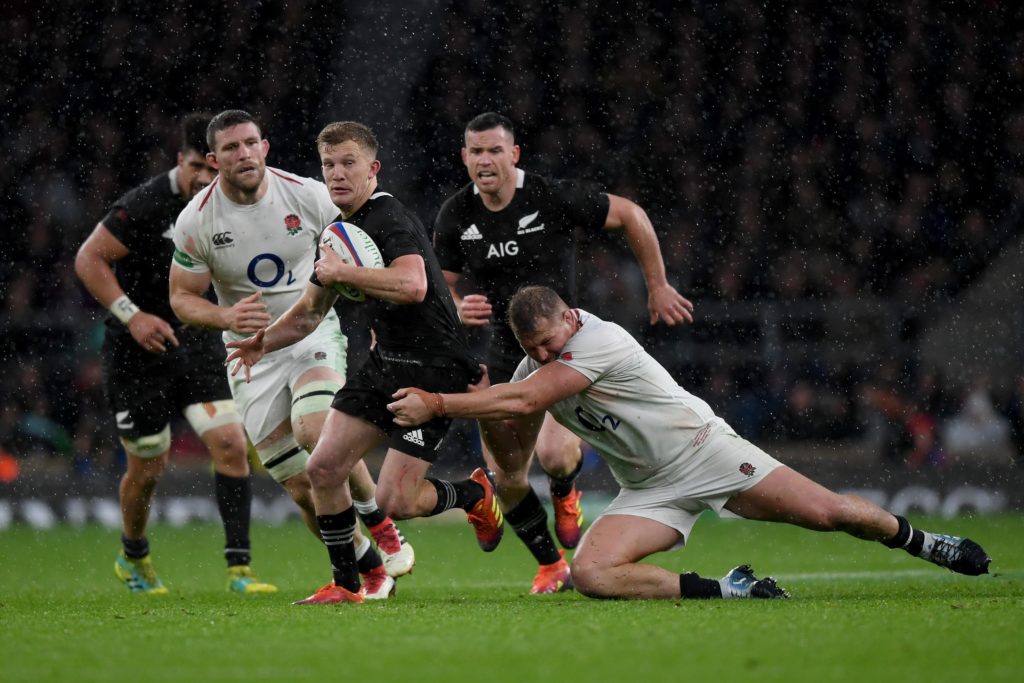You don’t need to be an expert in microeconomic theory or have a big rugby brain to understand the opportunity cost of the All Blacks starting both Ardie Savea and Beauden Barrett in big tests rather than having them provide impact from the reserves bench.
That’s where the loose forward and first-five/fullback respectively – very different players and individuals but similar in their former ability to enter a game and change it or allow the All Blacks to finish well over the top of an opponent – made their names in the black jersey.
They were part of a second-half black wave which generally engulfed whatever was facing them with an intensity and pace that was unsustainable for the opposition.
When Savea and Barrett were on the bench, all nations knew they were in for a genuine 80-minute battle and that the final quarter would potentially be more intense than the first thanks to the speed the pair possess.
Savea would lift the pace with his ball carrying into contact or pressure at the breakdown, while Barrett was, and still is, one of the best broken-field runners in the world. For the opposition, it was a tough physical challenge and a tough mental one, too.

In the middle of 2016, the then Wales coach Warren Gatland discovered what it was like to be on the receiving end of a Savea/Barrett onslaught as his side lost all three tests to the All Blacks in New Zealand. It was the beginning of Savea’s test career. Barrett was on the bench for the first two tests against Wales (behind Aaron Cruden), and started the third in Dunedin where he scored two tries and 26 points in total. For Barrett that was effectively the end of his bench role.
“They just keep coming at you,” Gatland said. “I’ve experienced that as a player in the past. You’re playing against a team that are used to playing at a higher level and they can continue to put you under pressure for longer spells. The more you experience that at that level the better you get and the more comfortable you get at playing for longer periods.
“It’s not a bad bench, is it? They had a bit of firepower to come on. Someone like Beauden Barrett coming on… Ardie Savea – I thought he was pretty instrumental when he came on as well. He added some firepower.”
Not any longer. Savea, who began his All Black career as an “apprentice” and went on a northern tour knowing he would be holding tackle bags in lieu of game time, and Barrett, are now so integral to the All Blacks that the selectors are compelled to start them both in big tests – tests such as the one against Argentina in Sydney on Saturday.
Savea will earn his 49th cap this weekend and, come Saturday, will have started just 24.
Barrett has enjoyed many more starts after that masterclass under the roof in Dunedin. Including the upcoming test against the Pumas, he will have started 58 in a total of 88 – but, with Carter and Ben Smith around for the first three years of his test career, he took a long time to reach that position. In Barrett’s first 23 tests, he started only three – against Italy in Rome, Japan in Tokyo and Argentina in Napier.
They just keep coming at you. I’ve experienced that as a player in the past. You’re playing against a team that are used to playing at a higher level and they can continue to put you under pressure for longer spells.
Warren Gatland on how the All Blacks could maintain their intensity throughout a match
The quality of the pair is without dispute, but Savea has had a better time of it than Barrett lately. Both have been shuffled around – Savea is capable of playing all three loose forward positions, while Barrett has mainly worn the No15 jersey over the last year and a half and is yet to re-discover the running form which made him one of the most feared counter-attackers in the world.
“He’s getting better and better as he gets older and stronger,” said former coach Steve Hansen of Savea after the All Blacks beat the Springboks in their first match of last year’s World Cup. “We’ve always known he’s an exceptional athlete, but he’s now at the peak of his powers. He’s really confident no matter where he plays, and gives us good X-factor.”
“Ardie is a special athlete,” added then Hansen’s assistant Ian Foster, now the man in charge. “His ability to influence a game, with and without ball, is outstanding. Often you see a player who’s great at one of those aspects. But he can influence both in big moments, and is a big contributor to our game.
“His attack stuff is good, and it can get better. Sometimes he puts so much effort into his ball-carrying he can switch out of a game a bit after that. We’re going to keep challenging him, too, which he probably doesn’t like hearing. But he will.”
Barrett, meanwhile, won World Rugby’s Player of the Year award in 2016 and 2017 for his ability to set a test alight at No10 and despite failing to reach those heights since, remains one of the best 10s or 15s in the world.
The ultimate cost of course is that now the All Blacks don’t have that game-changing ability on the bench.
What is making the All Blacks balance sheet tougher to reconcile is that Damian McKenzie appeared set to play the Barrett impact role but has yet to find the form, after recovering from a knee injury which ruled him out of last year’s World Cup squad, that tore France apart in the middle of 2018. McKenzie has been left out of the match-day squad altogether for the All Blacks’ final test of the year, with Will Jordan preferred.

Another concern is that there doesn’t appear to be any genuine impact players coming through the All Blacks ranks and challenging the status quo.
Australia have prop Taniela Tupou to make things lively in the second half of tests, although such is his form and growing importance to the Wallabies that coach Dave Rennie may see Tupou more of a starter now. Back-up halfback Tate McDermott has begun his test career well, however, and has provided more impact than TJ Perenara, an All Black struggling to match Aaron Smith’s pace, never mind take it to another level.
Perenara has had an important role on the bench as a mentor and impact player but, like many of the All Blacks, over the last three years he has struggled to cope with the modern game’s defensive line speed. Whereas Perenara’s extra physicality was once useful in a final quarter, now a speedier alternative such as Brad Weber may be more appropriate for the All Blacks.
Scott Barrett brought a dynamism when replacing either Brodie Retallick or Sam Whitelock in the second row that he is struggling to replicate now and Patrick Tuipulotu has again failed to take his Super Rugby form into the test arena.
All Blacks hookers Dane Coles and Codie Taylor could be relied on for impact but neither has brought the required bench energy recently and Asafo Aumua remains a work in progress. Prop Tyrel Lomax has potential due to his ball carrying but is in a similar stage to Aumua, while Ngani Laumape is still finding his feet after injury and there appears to be confusion about how to get the best out of Rieko Ioane, a world-class wing who wants to play in the midfield.
Yet one more issue is that the personnel on the reserves bench keeps changing. It is a mini team in itself but this year it has had no chance to find any sort of cohesion.
Once a point of difference for the All Blacks, now only wing Caleb Clarke and to a lesser extent Hoskins Sotutu have been impact success stories this year. But Clarke’s form off the bench against the Wallabies in his excellent debut in Wellington has made him the incumbent left wing.
And so the downward spiral continues.


Comments
Join free and tell us what you really think!
Sign up for free